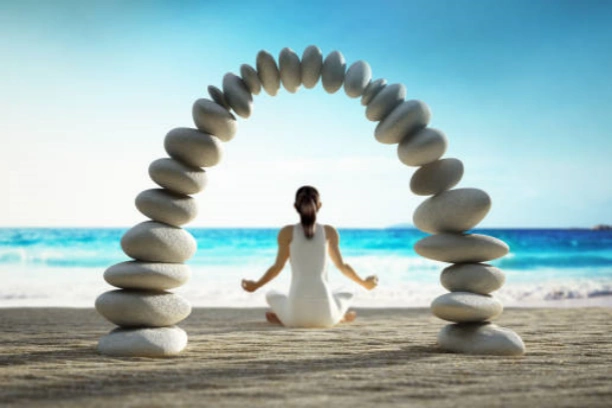The Etiquette of Sitting Meditation
For those who study the Bodhisattva’s practice of prajna, they should first arouse great compassion, make vast vows, diligently cultivate samadhi, and vow to liberate all sentient beings, not seeking personal liberation alone. Then, they should abandon all appearances, rest from all activities, unify body and mind, and harmonize movement and stillness.
In terms of diet, they should neither overeat nor eat sparingly. In regulating sleep, they should neither be excessive nor negligent. When desiring to practice meditation, they should find a quiet place, lay out a thick mat for sitting, and loosen their clothing. They should ensure their deportment is orderly, and then assume the full lotus posture. First, place the right foot on the left thigh and the left foot on the right thigh. Alternatively, the half-lotus posture is also acceptable, but the left foot should simply rest on the right thigh.
Next, place the right hand on the left foot and the left hand on the right foot, with the thumbs touching. Gently rock the body back and forth, then sit upright. Avoid leaning to the left or right, or inclining forward or backward. The spine should be upright, resembling a stupa. Also, do not stiffen the body excessively, which would cause restless breathing.
Ensure that the ears align with the shoulders, the nose aligns with the navel, the tongue touches the roof of the mouth, and the lips and teeth are closed. Keep the eyes slightly open to prevent drowsiness. If one achieves concentration, this method is most effective. In ancient times, accomplished meditators often kept their eyes open. Master Fahaiyun, in particular, criticized closing the eyes during meditation, referring to it as “the cave of the Black Mountain.” This carries a profound meaning, understood by those who have insight. Once the posture is established and the breath regulated, then relax the abdomen.

Do not dwell on good or evil thoughts. If a thought arises, be aware of it; when aware, it will vanish. Gradually forget the object of meditation, and merge into a single entity. This is the essence of sitting meditation.
I believe that sitting meditation is a path to peace and joy. Many people suffer illnesses due to not using their minds properly. By understanding this, the four elements will naturally be at ease, the spirit will be clear, and right mindfulness will be distinct. The taste of the Dharma will nourish the spirit, bringing tranquility and joy. For those who have realized this, it is like a dragon finding water, or a tiger rushing to the mountains. For those who have not realized this, it is like kindling a fire with a gentle breeze—although the effort is not great, as long as they can discern a willing heart, they will not be deceived.
Nevertheless, the path is high and the demons are powerful, and circumstances are constantly changing. But as long as one can maintain right mindfulness, nothing can obstruct them. The “Lankavatara Sutra,” “Tiantai’s Mohe Zhiguan,” and Guifeng’s “Xiu Zheng Yi” all clearly explain demonic phenomena, preparing practitioners for unforeseen circumstances, which is something one cannot afford to overlook.
When one wishes to rise from meditation, do so slowly and calmly, without sudden movements. After rising from meditation, always act skillfully in every situation to preserve the power of concentration, like caring for an infant, and then the power of concentration will easily develop.

The practice of meditation is of utmost urgency. Without peace, tranquility, and contemplation, one is bound to be bewildered at this point. Therefore, it is said that a pearl can only be found in still waters, and it is difficult to catch the reflection in moving water. When the still water is clear, the pearl of the mind will naturally appear. Thus, the “Sutra of Perfect Enlightenment” states, “All unobstructed pure wisdom arises from meditation.” The “Lotus Sutra” states, “In a quiet place, cultivate and guard your mind. Stay still, like Mount Sumeru.”
Therefore, it is known that transcending the ordinary and surpassing the holy relies on a foundation of tranquility. To be free from sitting and yet not be lost, one must rely on the power of concentration. Even in one’s entire life, there is fear of wasting time, let alone procrastination. How can one oppose karma? Therefore, the ancients said, “Without the power of concentration, one willingly submits to death’s door, closing their eyes and returning empty-handed, as if wandering aimlessly.” Fortunately for fellow practitioners, by repeatedly studying this text, one benefits oneself and others, and together attains enlightenment.







